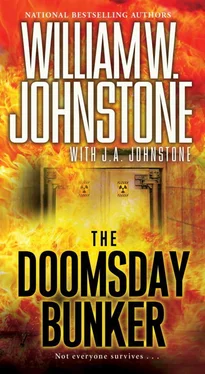Everyone in the now hushed bunker heard Moultrie draw in a deep breath. When he resumed, the strain that they were all feeling was evident in his voice.
“The entire world is at war. There can be no doubt about that. The lines of communication are becoming more spotty with each passing minute. All conventional broadcasting is off the air, likely as the result of nuclear airbursts and the ensuing EMPs. Wireless networks are down as well. Satellite Internet connections are failing, doubtless due to infrastructure damage, but the fact that we’ve been able to maintain a connection here at the Hercules Project tells us that our aboveground equipment is still functioning. There are also operators sending on old-fashioned ham radio rigs that don’t depend on computers, and we have radios in the control center to pick up those transmissions as well. But I won’t lie to you, my friends.
“The world is going dark and quiet even as I speak to you now. On the eve of World War I, a British government official said, ‘The lamps are going out all over Europe, and we shall not see them lit again in our lifetime.’ The first part of that statement is true now for our entire planet. But I refuse to believe we shall not see them lit again in our lifetimes. Certainly, some of us will not. But as human beings, we cannot give up hope. That is why each and every one of us is here: because we still have hope that our world has a future. This is not the end, my friends. The Hercules Project is the beginning.”
The speakers clicked off again.
“Do you believe him?” Susan asked as she huddled against Larkin. “Do you think he’s right about there still being a future?”
“What other choice do I have?” he said.
* * *
The human mind can cope with only so much tragedy and trauma before retreating into a stunned state. So it was in the vast underground bunker as people began to sit down and talk quietly as they waited to see what was going to happen. There were still some sobs, but the terrified screams and angry shouts had subsided.
Susan, Jill, and the kids sat on one of the bunks while Larkin and Trevor stood nearby. Larkin saw the way his son-in-law kept swallowing hard and wiping at his eyes with the back of his hand. He kept his voice down as he asked, “You’re thinking about your folks, aren’t you?”
Trevor swallowed again and said, “You know, I tried to get them to move up here so they’d be closer. And then, when the deal with this place came up, I tried again. I wanted them to invest in it. But they didn’t want to leave their home. They’d been there for forty years.”
“Can’t blame them for feeling that way,” Larkin said. “And listen, when you stop and think about it, Midland is a long way from where any of the bombs went off. Given the prevailing winds, the fallout might not even be too bad where they are. They can make it through, and when things calm down—”
“They’re in their seventies, and the electromagnetic pulses have wiped out technology,” Trevor interrupted. “How long do you think they’re going to survive once everything goes back to a nineteenth-century level?”
“People in the nineteenth century did okay.”
“Did they really? Life expectancy was a lot shorter then. Almost any little thing can kill you without modern medical attention. Besides, people back then didn’t know any different. People today aren’t equipped, either mentally or physically, to live under those conditions.”
Larkin knew Trevor was right about that. “Maybe so,” he said, “but I don’t think you should give up hoping that they’ll be all right.”
“I’m not going to. I’m just not sure it’s going to do any good.”
Larkin didn’t know what to say in response to that, but he was saved from having to say anything by a sudden commotion over near the stairs that led down from the upper level.
At first Larkin thought another fight had broken out, but then he spotted a group of people coming down the stairs, led by Graham and Deb Moultrie, who were holding hands. Several red-vested members of the security force followed them.
Moultrie stopped while he was still several steps from the bottom, so he could look out over the crowd. All over the bunker, people moved in his direction, eager to find out what had brought him down here and hear anything he had to say. He lifted a bullhorn to his mouth and his amplified voice filled the chamber.
“Please, gather around, my friends. I have more news, but I wanted to tell you face-to-face.”
“Is it over?” a man yelled. “Will there be any more bombs?”
“I can’t tell you for sure,” Moultrie replied, “but I believe the attacks have ended. The reason for my uncertainty is that we’ve lost all communication with the surface.”
Larkin glanced up. The surface was less than a hundred and fifty feet above their heads, but right now it might as well have been on the other side of the moon.
“All Internet and wireless networks are off-line,” Moultrie continued through the bullhorn. “We have no satellite or cable connections, and the ham-radio frequencies have gone silent as well. Our hope is that some of those ham operators will resume broadcasting at some point, so we’ll have some idea what’s going on in the world, but until then all we can do is wait.”
“What about your instruments on the surface?” a man asked, raising his voice to be heard.
“They’re functioning. Approximately half an hour ago, immediately following the detonation of the warhead in the Arlington area, thermal sensors detected a temperature spike to just under five hundred degrees lasting fifteen seconds. According to our calculations, our location here should have been on the outer edge of the thermal blast radius. We also detected wind speeds in excess of two hundred miles per hour from the concussion blast.”
Susan moaned softly as she stood next to Larkin. She knew as well as Larkin did that nothing living could withstand a heat wave like that. Not caught in the open, anyway. People hiding in basements or storm cellars might have lived through such a fiery burst.
But that didn’t mean they were safe, because as Moultrie went on, “Our sensors have also picked up extremely high levels of radiation, and while the winds and the heat have subsided, the radiation has not. We’re shielded from the radiation here—our internal sensors continually monitor the levels, and we’re perfectly safe—but anyone on the surface who somehow survived the initial blast will suffer from radiation burns and poisoning that will prove fatal, probably sooner rather than later.”
“You’re saying we’re the only people left alive!” a woman cried out in a strident voice.
Moultrie shook his head. “No. I’m saying that we can be relatively sure of what happened in this area, but we don’t know what’s happened elsewhere, and unless and until we get word from outside, we won’t know anything more. I firmly believe that in the short term, there will be survivors from this attack. But with the widespread death and destruction, the collapse of civilization as we know it, the inevitable rise of disease, and the lingering threat of radiation… over time, we may well be the last ones left in this part of the world.”
People began to cry again.
“I want to assure you that the Hercules Project is secure,” Moultrie continued. “All of our equipment is functioning perfectly, just as we designed and intended. We will remain down here, safe and together, until our instruments indicate that it’s safe to begin exploring the surface. When the time comes, that will be done on a very limited basis until we can be absolutely certain what the situation is. I will not do anything— anything! —to risk the security of the project until I’m sure that—”
Читать дальше









